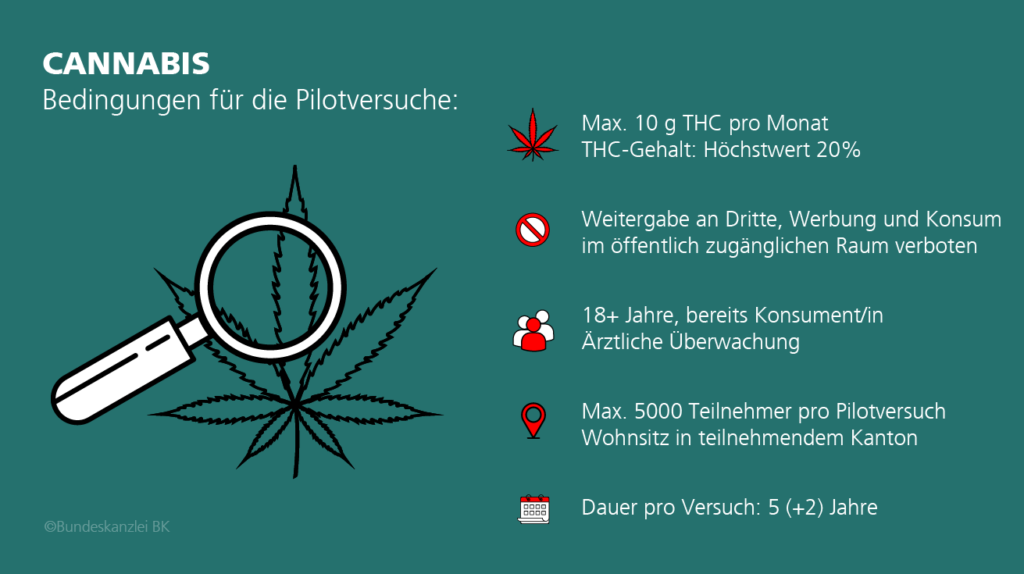
In May 2023, the University of Bern’s cannabis pilot project was approved by the Federal Office of Public Health and the cantonal ethics committees concerned. Under the name “SCRIPT – The Safer Cannabis Research In Pharmacies randomized controlled Trial”, the health and social effects of regulated cannabis sales will be investigated in the cities of Bern, Biel and Lucerne. If everything goes smoothly, the trial will start this fall.
What are the pilot tests about? The pilot projects are intended to provide scientific evidence for the discussion on possible cannabis legalization. You can read more about the history of the pilots here and in our latest update on the pilots.
How does the SCRIPT study work?
Once the trial begins, the first half of the approximately 1,000 participants will be able to legally purchase cannabis products at selected dispensaries in the cities of Bern, Biel and Lucerne. Offered in addition to the flowers are other products such as hash, liquids and oils – all neutrally packaged so as not to attract attention. The second half of the study participants may also legally purchase cannabis 6 months later. This randomized allocation is intended to maximize the power of the study by direct comparison.
Study data will be collected at six-month intervals during the approximately 2 years of the trial using questionnaires and interviews. The focus is on the impact of regulated cannabis sales on people’s consumption patterns and health. In addition to the large surveys, sales staff are also encouraged to engage in conversation with customers when selling study cannabis in order to capture an even more accurate picture of reality.
Participation in the pilot test
Registration for the SCRIPT study is scheduled to open in early summer 2023 for interested individuals residing in the Canton of Bern. People from the city of Lucerne will have to be patient until they can get to one of the 300 or so study places in their city in winter 23/24. As in all other pilot trials, the study is only open to individuals who are at least 18 years old and have a history of using cannabis in their daily lives.
Those admitted to the study will receive a study card that entitles them to purchase 10g of THC per month. During the first purchase, a detailed consultation should take place in order to present the various products to the customers in detail.
Question that arises: What happens if the police pull me over and I have study cannabis in my pocket? Again, the answer lies partly in the student ID card. Of course, since the authorities do not know who is participating in the study, study participants must be able to identify themselves in the event of police contact for carrying cannabis. The other conditions for an unmolested walk through the city: the original package must be unopened, because the products may not be consumed in public spaces, and the limits of max. 10g of cannabis flowers or hashish or a maximum of 2g of THC for liquids and oils may not be exceeded. Not particularly suitable for everyday use – but the study is still taking place in a time of repression…
Herba di Berna and the pilot tests
Even if we as Herba di Berna – despite our specialty store – cannot participate in the pilot test, we are basically pleased about the study. Finally, something is happening in Bern, too. Legalization preparation is approached scientifically. A regulated sales concept lays the groundwork for ensuring that legalization does not become a leap from the sharpie market to the Wild West. It is not about a few companies being allowed to take money out of everyone’s pockets and rake in fat profits. Instead, the focus is on sales by trained professionals to finally make high-quality products with clearly declared ingredients legally available to meet the real need of large segments of the population.
It is questionable whether we really need to carry out our own elaborate tests in advance instead of simply taking the empirical values of other countries to heart. But we have inevitably learned to practice patience and enjoy small steps.
More info on the SCRIPT study: script-studie.ch









